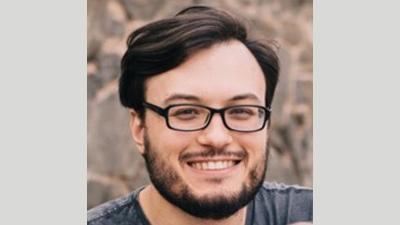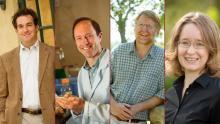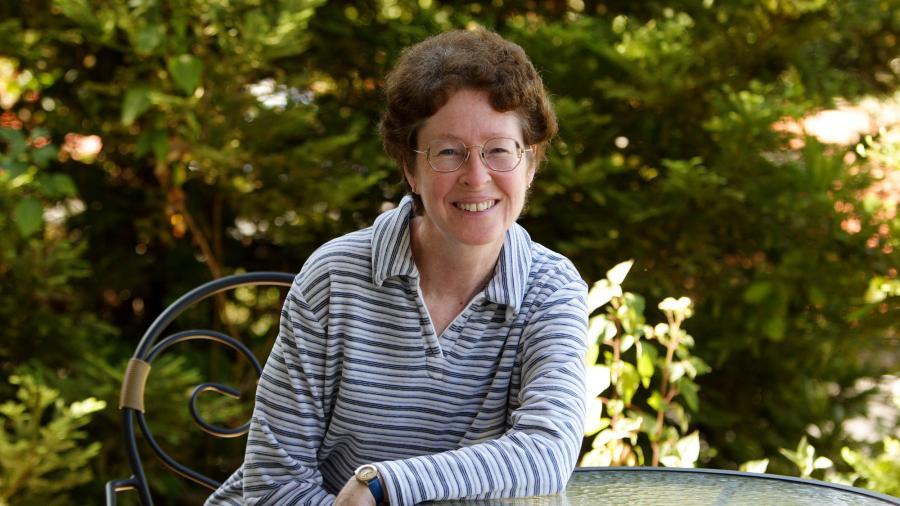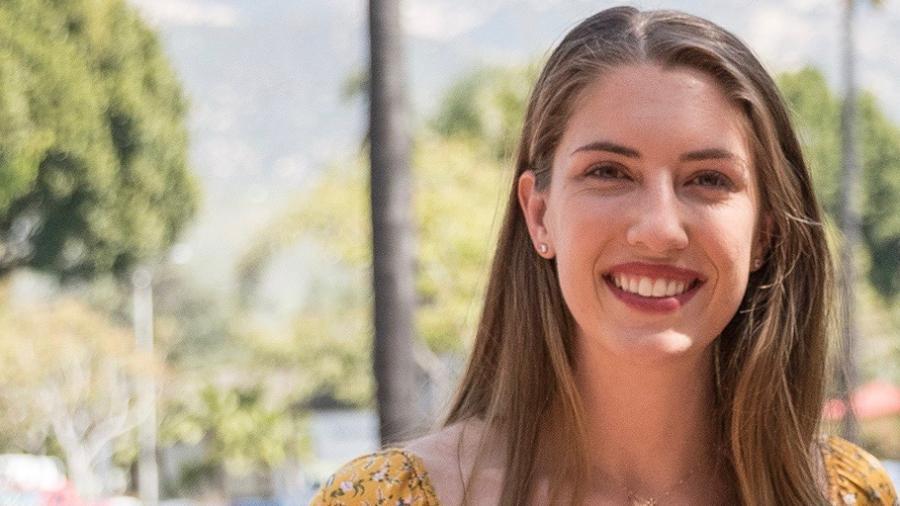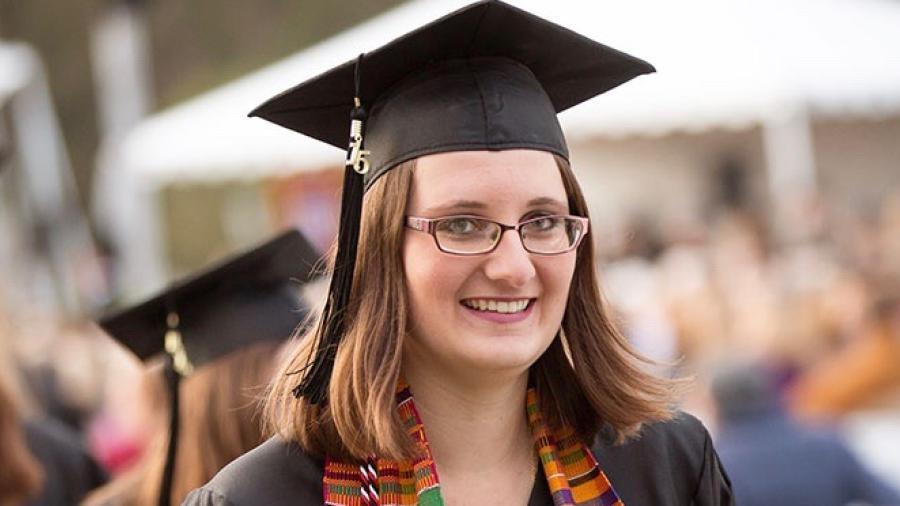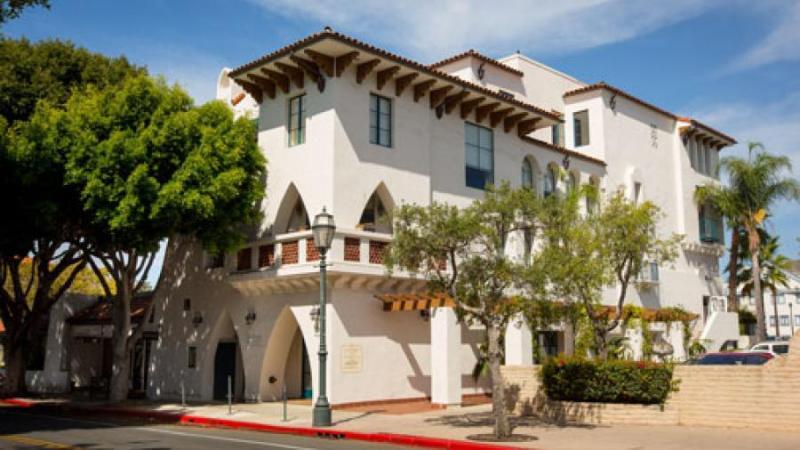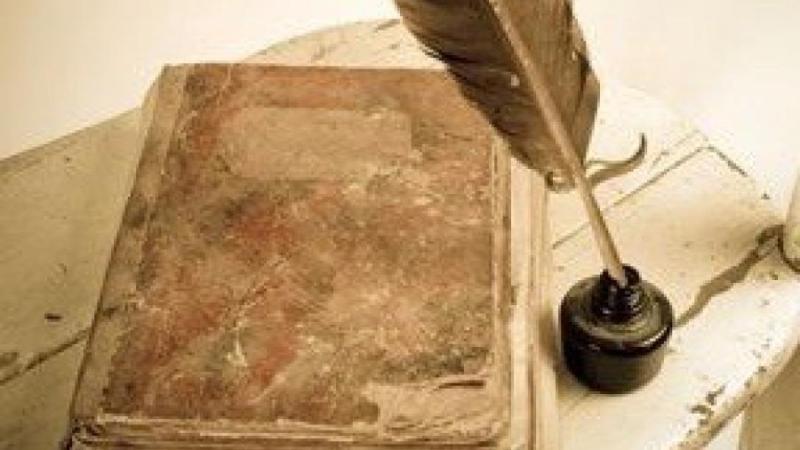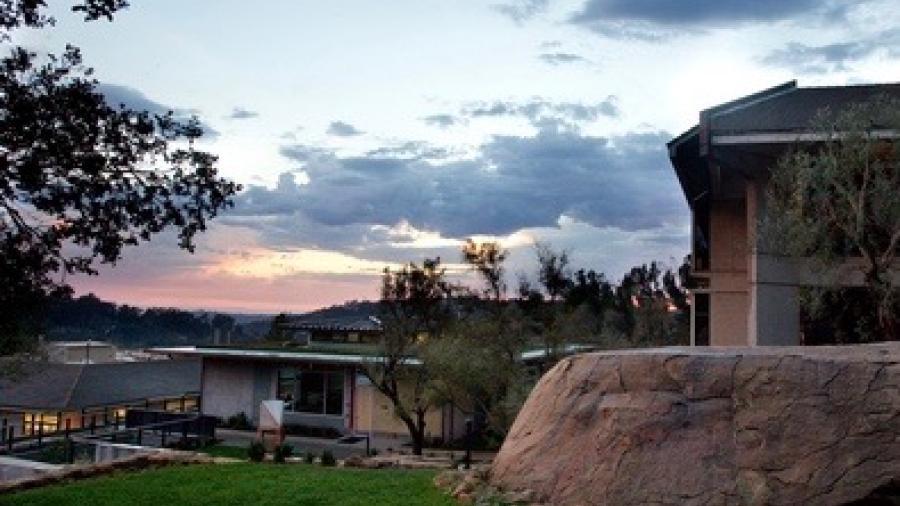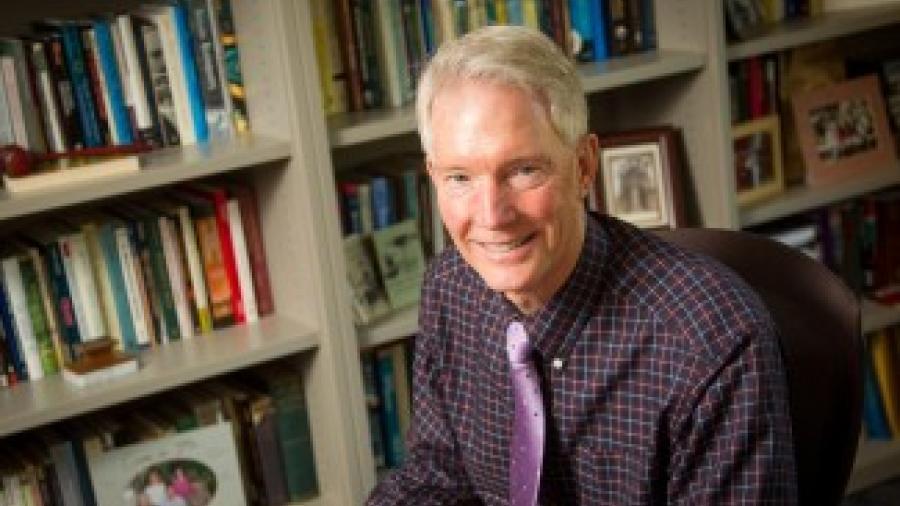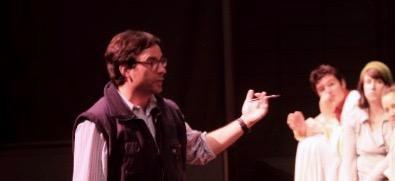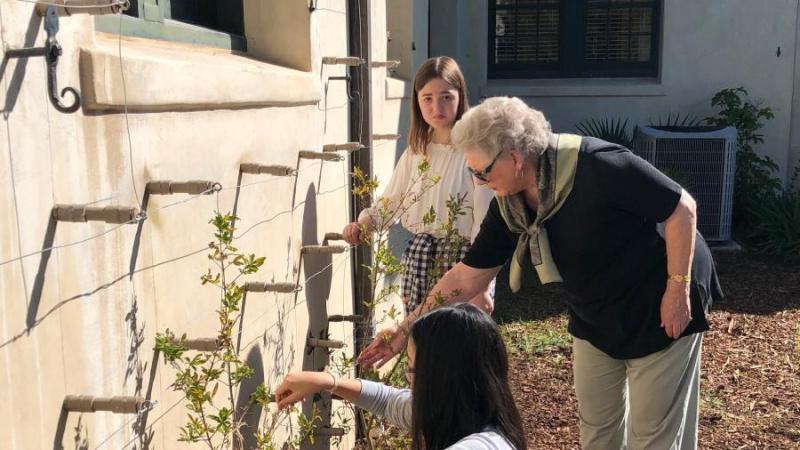If you are like me, you are feeling both relief and gratitude that we were able to finish the semester without further disruptions to our schedule. Commencement had a bright spirit as we watched more than 320 students cross the stage. But a drive by the huge boulders and stacked tree limbs near the corner of Olive Mill and Hot Springs Roads is an eerie reminder of the tragic start to the term—and its ongoing reverberations.
This month we will not be holding our usual faith-learning seminar, but rather inviting faculty to work with Habitat for Humanity on projects of cleanup and reconstruction. Numerous faculty have already volunteered. Those still interested should contact Patti Hunter. She is coordinating efforts with Liz Beebe, who is directing many recovery endeavors for Habitat in Montecito.
There is plenty of good work already underway this summer, including scholarly projects, more than 20 faculty-student research collaborations, lab renovations in Whittier, as well as Mayterm classes and planning for the second Trailhead program and the Westmont Initiative in Public Dialogue (see below).
Asked to read some psalms at the year-end faculty dinner, Paul Willis recalled how Steve Jacobson of La Casa de Maria found new resonance in Psalms 29 and 97 after this year. “The voice of the Lord . . . breaks the cedars,” “twists the oaks,” and “strips the forest bare,” even as the “mountains melt like wax.” And yet, “the Lord gives strength to his people” and “blesses his people with peace.” I trust that you will know that strength and peace in this summer of restoration and renewal.
Mark L. Sargent
Provost
UPDATES
NEW CHEMISTRY PROFESSOR
I am pleased that Brandon Haines will be joining the Chemistry Department in the fall as an assistant professor. Currently a postdoctoral fellow at Emory University in Atlanta, Brandon completed his undergraduate degree at Grand Valley State University in Michigan and his doctorate from the University of Notre Dame. At Notre Dame, Brandon won a research award as well as teaching honors in Organic Chemistry. In his work at Emory, he has been studying reaction mechanisms with computational methods, especially related to C-H (carbon-hydrogen) functionalization. His expertise with computational chemistry will provide several opportunities for Westmont students to collaborate with him on research endeavors.
During his graduate study and postdoctoral work, Brandon has been the first author on seventeen articles or presentations, and contributed to several others. At his church in Atlanta, he has been involved with Food for the Hungry and with helping foster families.
TEACHING AND RESEARCH AWARDS |
ADJUNCT TEACHING AWARDS |
|
At the Commencement ceremony, three faculty members were presented with the Outstanding Teaching Awards for their academic divisions, while one was granted the Faculty Research Award. The awards are based on nominations by graduating seniors and faculty colleagues. Here are the four recipients of these honors, along with a brief statement based on the remarks I gave when making the presentation during Commencement. Congratulations to all of them upon this recognition from their peers: Jesse Covington, the recipient in the Social Sciences, has shaped the Augustinian Scholars curriculum and nurtured a sense of community within the group, entreating students to explore landmarks in the Christian intellectual tradition even as he promotes reflection on what it means to serve the common good. For two years I worked closely with Steve Julio—the recipient in the Natural and Behavioral Sciences—when he was the vice chair of the faculty, and I came to admire his buoyant spirit and good will. As a scholar, he has steadfastly studied the virus that causes whooping cough and earned a major grant from the National Institutes of Health. In his own poetry and essays (including three books published just this year), Paul Willis—the recipient in the Humanities—calls us to see what is beautiful, ironic, and sacred in our habitual walks and in our luminous encounters with nature. The recipient of the Faculty Research Award is Caryn Reeder, who has devoted much of her scholarly life to exploring the interface of religion and violence, in both political and domestic landscapes. Her latest book on war, peace, and gender in the Gospel of Luke will be published in the coming months by Cambridge University Press. |
During the annual Employee Brunch we announced that three individuals had been chosen to recieve the Outstanding Adjunct Teaching Awards. So many of our adjuncts have been sacrificial with their time and faithful over numerous years. Graduating seniors will often identify adjunct professors among their most important mentors. So it is a privilege to salute these three for their excellent contributions to our academic community. Nichole Dechaine, who has been an adjunct instructor of voice and vocal pedagogy, has served as the co-director of choral ensembles, and has been our Vocal Music Recruitment Outreach Coordinator. As Michael Shasberger states, “Our biggest challenge each year is choosing which students have the privilege of studying voice with her.” Jason Eldred has been teaching World Civilizations and Perspectives on World History for the past seven years. He consistently gets rave reviews from students. One student comments, "I loved this course. I've never been a history person, but I would take this course again in a heartbeat." Stephen Zylstra has taught over eight courses for the Philosophy Department as well as the senior seminar in Bioethics for the Biology Department. After observing him, a colleague said, "I inevitably leave Stephen’s classes with a sense of having been educated and inspired by him both philosophically and pedagogically. He is an adept and artful thinker and teacher." |
BETH HORVATH TAPPED FOR EXPERTISE ON SEA CORAL
Beth Horvath is getting ready to do some deep sea diving. Virtually.
In April the National Oceanographic and Atmospheric Association (NOAA) held a workshop at UCSB on “scoping” for the West Coast Initiative of its Deep Sea Coral Research Technology Program. The workshop was designed to prioritize, focus, and develop protocols for NOAA's upcoming cruising seasons (2019 and 2020), when scientists will explore the deeper waters off the coasts of California, Oregon, and Washington. The specific focus of the workshop was on areas off the western coast that are largely unexplored, most of it at far greater depth than has been looked at to date.
Beth is one of the few researchers working on the west coast who specifically study deep water corals. On this new initiative, her expertise as a gorgonian coral taxonomist will help focus the work that will be done on the expedition by NOAA. She will guide shipboard crews, and follow divers via cameras as they explore the depths. Beth will direct them so they will know how best to use the latest technology available—remotely operated vehicles (ROVs), autonomous underwater vehicles (AUVs), manned submersibles, and other instruments deployed from the mother ships. She will be informing them what to look for, where to look for it, and how to go about collecting, recording, and photographing what is seen.
SPORTS UPDATE
For the sixth straight year, Westmont has won the All-Sports Award for the Golden State Athletic Conference (GSAC). Both women’s and men’s track and field teams claimed conference titles, the women nearly tripling their closest competitor and the men nearly doubling their nearest rival. Madison Herrera was named the MVP of the women’s meet for the third consecutive year, scoring 41.5 points (including victories in the long run, 100 meter hurdles, and the 4 x 100 meter relay). Anthony Cota took the top honor for men with 37 points (including victories in the high jump, javelin, and both 4 x 100 and 4 x 400 meter relays). An All-American in basketball, Lauren McCoy (photo) took second in the high jump; she was also selected as Westmont’s Scholar-Athlete of the Year for her blend of athletic and academic accomplishments.
A strong finish took the baseball team into second place in the conference at the end of the season with a record of 33-14. Michael Stefanic was the co-player of the year in the GSAC. He is the first Westmont baseball player to be named all-conference for four straight years and to win four Gold Gloves. Both men’s and women’s tennis teams made it to the conference championship match, though both teams fell just short (the women by a single game). The tennis teams as well as the baseball club were selected for their NAIA national tournaments.
Congratulations to Athletic Director Dave Odell and Vice Provost Patti Hunter for receiving this year’s Jane Higa Awards for academic and co-curricular partnership. I have consistently appreciated how Dave works to support the integrity of the academic program and the ethical standards of his athletes. Assisting athletes and coaches with academic and scheduling challenges is just one of the many ways that Patti has endeavored to ensure connections between the classroom and the co-curricular programs. She has routinely accepted the challenge to build bridges and develop new strategies for collaboration.
ONE FOREIGN AFFAIRS FELLOW, TWO FULBRIGHTS
Sophia Meulenberg, former Westmont Monroe Scholar and Political Science graduate, is one of thirty individuals selected as a Pickering Foreign Affairs Fellow. She will receive two years of financial support for graduate school, as well as mentoring and professional development to prepare for a career in the Foreign Service. She will complete a domestic internship at the U.S. Department of State in Washington, D.C. and an overseas internship at a U.S. embassy and then have a job with the State Department upon graduation. Sophia will attend Georgetown University in the fall to complete her master’s degree in Foreign Service. She's just returned from Senegal after two years of service in the Peace Corps.
Two Westmont seniors have been granted prestigious Fulbright Scholarships to teach overseas next year. Hugh Grant-Chapman, a Political Science major, will be teaching in Taiwan, while Biology graduate Alexa Mogck will be working in Malaysia. Both are part of programs that place grantees in schools overseas to supplement local English language instruction and to provide a native speaker in the classrooms.
FACULTY PROMOTIONS
- During the Board of Trustees meeting earlier this month, five faculty members were granted promotions.
- Three of the five—Steve Julio (Biology), Don Patterson (Computer Science), and Jane Wilson (Education)—were promoted to full professor. Another two colleagues—Carmel Saad (Psychology) and Rachel Winslow (History)—were advanced to associate professor. Be sure to congratulate them when you see them this summer.
WESTMONT INITIATIVE FOR PUBLIC DIALOGUE
- Deborah Dunn and Rachel Winslow have launched the Westmont Initiative for Public Dialogue (WIPD). The initiative, associated with Westmont Downtown, works with neighbors to speak and listen well together about the challenges facing the Santa Barbara community for our common good and human flourishing. The first conversation, which took place on April 12 at the First Presbyterian Church, focused on how to care for vulnerable children, with an emphasis on the foster care system. A second conversation on foster care will occur in Santa Maria in July. Next fall, a more visible launch will take place with a conversation on immigration, using the framework established by the National Issues Forums Institute. Rachel and Deborah spent a year working as research fellows with the Kettering Foundation in Dayton, Ohio to prepare for this work.
- The vision of the WIPD is to promote the common good, equip students and neighbors to facilitate effective community dialogues, cultivate human community through healthy conversation and listening, help community partners frame issues well, support democratic participation, and endeavor to tackle "wicked problems."
RESEARCH SYMPOSIUM
More than fifty students exhibited their scholarly work in the 22nd annual Spring Research Symposium held in Winter Hall on April 12. As usual, the Symposium featured projects done in Biology, Chemistry, and Psychology, but we have recently seen an increase of contributions from English, Sociology, and Computer Science. Some of the Computer Science projects were related to the new Data Analytics program, and included studies of wildfire prediction, glacier modeling, traffic flow, and algorithms for growing plants. The Data Analytics major already has ten students enrolled in its first year.
Among the Humanities and Social Science projects, there was an analysis of migration and economic development, a screenplay about religion and Artificial Intelligence, a study of rap music, and a translation of poems by Chilean Nobel laureate Gabriela Mistral. Kinesiology students did a couple of studies on rock climbing. Psychology students undertook projects on Parkinson's Disease and cross-race peer relationships. Two of the Chemistry endeavors focused on quantum dots, the semiconducting nanoparticles that produce bright, long-lasting, colorful fluorescence. The wide scope of topics reveals how the Symposium has been gaining researchers and attendees from across the liberal arts spectrum.
NEW WRITING MINOR
|
UPDATES ON ACADEMIC SENATE AND MAYTERM
In the final months of the year the Academic Senate began reviews of new proposals for a Bachelor of Music degree (we currently offer a Bachelor of Arts in Music but not a Bachelor of Music) and a Film Studies minor. Reviews will be finished early next fall.
In addition to looking forward to new program development, the Senate regularly considers refinements to current programs and policies. Here’s a quick summary of a few actions:
Under the new SAT scoring, we have decided to proceed with a 610 verbal score as the standard that exempts students from completing English 002: Composition. We had estimated that 610 under the new SAT would be roughly equivalent to our previous standard of 580 under the old one, and the results this year proved that to be the case. Next year we will explore some alternatives to the SAT as the yardstick for assessing writing competency.
The Economics and Business major will be enlarged by four credits to require an internship or research with a faculty member. After a successful pilot last year, we will increase the number of one-credit seminar options for Augustinian scholars in their second and third years. New seminars will focus on topics like the local/global church, stewardship, and interpersonal relations. Students in the Successful Scholars Seminar, required of those on probation, will now receive one academic credit for the course, which has been revamped by Sonya Welch. The Political Science Department revised its International Security and Development track to give students more flexibility by limiting the required courses and increasing departmental electives.
Mayterm enrollment has reached 210 students, up from 173 and 169 the previous two years. We have 37 students enrolled in our pilot online courses in Creative Writing and Computer Science as well as in the internship practicum.
THE THEOLOGICAL LIFE OF PI . . . AND HOW TO PACK A SUITCASE
Russell Howell was asked by the board of the Association of Christians in the Mathematical Sciences to be the editor for the 21st volume of their Proceedings, which was just published as their first peer-reviewed version. More recently, he was asked by Christianity Today to write a piece for “Pi Day” (March 14, or 3.14) that would connect Pi and primes with theology. His article was “Food for Thought: The Theological Life of Pi: The mind-boggling discoveries of computers and what we—and God?—still may never know.” Over spring break, Russ was the keynote speaker for the biannual lecture series of the Associated Colleges of the Chicago area. His talks, given at Elmhurst College, were “RAM and Recursion” and “Complementary Partial Orders, or How to Pack a Suitcase.” He also gave a talk during a stint at Trinity Christian College and helped the CCCU decide on grant awards. Along with his research student David Kyle, Russ recently published the article “Locating trinomial zeros” in the journal Involve; their article discusses formulas they discovered for counts of interior and exterior roots of special types of complex-valued functions, thus solving a problem posed in an award-winning paper from 2014.
SPANISH COMEDY, FRENCH GARDENS |
|
| Mitchell Thomas just played a leading role in UCSB’s LAUNCH PAD production of Anna Garcia-Romero’s Staging the Daffy Dame. Featured in American Theatre magazine in 2013 as an innovative model of new play development, the LAUNCH PAD is a high-tech lab for playwrights-in-residence, aspiring theatre students, and faculty guests and artists. Garcia-Romero’s play is set on the campus of a California public university, as a Latinx theatre professor directs a production of the 1613 Spanish Golden Age comedy La Dama Boba (“The Daffy Dame”). As the characters prepare to perform the seventeenth-century play, they grapple with issues of race, class, and gender raised by the play, even as current national politics begin to invade their personal lives. | Mary Collier taught a first-year seminar this spring focused on French gardens; she and her students read some selections of literature and history and planted two pomegranate trees on the garden wall of the bookstore. As Mary states, “the tender young branches of the two pomegranate trees espaliered on the structure have all the support they’ll need to grow up and over the wall . . . The newly formed Espalier Society, made up of the students enrolled in the class this semester and students who have followed the class with interest, will meet at the wall regularly to pinch, prune, tie, and retie the growth over the years to come." Paul Valéry’s poem “Les Grenades” will be posted on the wall, along with a marker saluting the “Classe du Printemps 2018” for planting the pomegranates. |
Provost's Report Archives
2018 |
2017 |
2016 |
2015 |
2014 |
Felicia Song
wejaioysfaiuosgipsEHFGpiuehfo[uHGouwg'ouweHGIOehf
Felicia Song was invited by Trinity School of Durham, North Carolina, to address area ministers about "Speaking into Our Digital Lives: A Matter of Christian Formation & Public Witness." While she was there, she spoke to a group of parents on the topic "Exhausted from your Insta-Snap-Tweet-texting Life? Sociological and Theological Reflections on Technology." Afterward, she attended the Winter Seminar at the Louisville Institute in Kentucky with other Louisville Grant recipients.
Felicia was also a plenary speaker at the Apologetics Canada Conference 2018 in British Columbia. There, she gave a TED-style talk on "Social Media: The Industrialization of the Relational," and she led two breakout sessions on "Digital Life as Secular Liturgy." Later that month, Felicia served on a panel called "Religion and Social Media: Is there an App for That?" and spoke about digital practices at St. Andrew's Presbyterian Church in Houston.
Amanda Sparkman had an article entitled "Convergence in reduced body size, head size, and blood glucose in three island reptiles" accepted for publication in the journal Ecology and Evolution. Her research was conducted in collaboration with four student co-authors (Nicole Kabey '16, Kenny Chism '17, Lillian Brummett '18, and Lucia Combrink '19), as well as colleagues from Auburn University.
Helen Rhee recently published two articles: "A Bishop's Work is Never Done," in Christian History Magazine; and "Wealth, Church, and the Transformation of Early Christian Worship" in The Yale ISM Review. In April, Helen was a participant in the Global Generosity Roundtable sponsored by Christian Super (an Australian investing group) in Brea, and presented a paper, "A Response to Miroslav Volf's 'Vanquishing Suffering,'" at Biola University's conference on Suffering and the Good Life. She was also awarded a CCCU Scholar's Retreat Grant for the Spring 2019.
Mark Nelson gave an invited reply to The Normative and the Natural, by Jeremy Koons and Michael Wolf, at an "authors-meet-critics session" hosted by the International Wilfrid Sellars Society during the American Philosophical Association meeting in San Diego.
Cynthia Toms published "From Homemaking to Solidarity: Global Engagement as Common Good in an Age of Global Populism" in the Journal of Christian Higher Education.
Sandra Richter attended the Pacific Region Society of Biblical Literature meeting in Los Angeles, where she was announced as regional president for 2018-2019. Sandra also taught a weekend Bible conference for the First UMC Discipleship Retreat in Baton Rouge, Louisiana. She will be featured in a forthcoming Good News Publication in May.
Deborah Dunn participated in a weekend-long discussion of the implications of the work of Renee Girard on Violence and the Sacred at Corrymeela, in Ballycastle, Northern Ireland. She also conducted a leadership development workshop for 45 doctoral students in psychology at George Fox University in Oregon.
Rick Pointer participated on a panel about "Indian Missions and the Church-State Conundrum" at a conference on Religion and Politics in Early America, sponsored by the Society of Early Americanists and the John Danforth Center on Religion and Politics at Washington University. His article "Grace, Goodness, and Independence in Revolutionary America" will appear in The Eighteenth Century:Theory and Interpretation.
Ronald See was the featured guest speaker for Brain Awareness Week at the Faculty of Medicine, University of Ljubljana, Slovenia. He presented several different lectures on a variety of neuroscience topics, including drug addiction, mental disorders, and sleep function. He also conducted training for the communication of neuroscience topics to the public, and provided scientific consultation to the Institute of Pathophysiology.
Carmen McCain recently presented a paper “Hausa Girl: Virtuous Brides and Venal Actresses in Nigerian Novels of Kannywood” at the American Comparative Literature Association Conference held at UCLA.
Maryke van der Walt and student Sophia Gigliotti ‘20 attended the 11th annual Women in Mathematics in Southern California Symposium held at Pepperdine University. Maryke also presented a talk there, entitled "A Deep Learning Approach to Diabetic Blood Glucose Prediction."
Sameer Yadav recently received a grant from the John Templeton Foundation that will enable him to take a one-year research leave next year to work on a book project dealing with a mystical experience in Christian theology. The grant also supplies funds to gather together a small group of philosophers, theologians, and cognitive and social scientists for a workshop in the Spring of 2019.
Cheri Larsen Hoeckley presented a paper on George Eliot's novel Daniel Deronda at the 18th- and 19th-Century British Women Writers Conference in Austin. The paper is entitled "Decentering the Englishwoman: Reading George Eliot's Alcharisi after Crenshaw's Intersectionality." The argument is part of her ongoing work on 19th-century women authors living abroad, and our language for the movement of people.
Lauren Kelley will be co-presenting with librarians from Carnegie Mellon University at the Library Instruction West Conference in July. The presentation is entitled "Swipe Right on JSTOR: Modeling Online and Speed Dating Methodologies to Match Students with Library Databases."
Randy VanderMey spoke at the invitation of Providence Christian High School to their school's chapter of the California Scholastic Federation. His talk was entitled "What is your pronoun? Questions Across the Curriculum." The book Armand Merizon: His Life and Art, by Muriel Zandstra, was awarded a 2018 national Independent Publishers "IPPY" first place award for a first time book-length publication. The book incorporates significant portions of a biography Randy wrote about the artist 30 years ago.
David Vander Laan's article "The Paradox of the End without End" has been published in the journal Faith and Philosophy.

